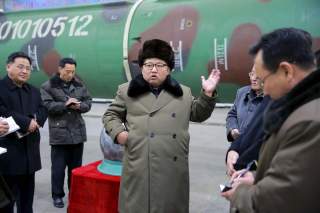4 Frightening Ways North Korea's Nuclear Weapons May Actually Be Used
Four ways Pyongyang and its nuclear weapons could become even more dangerous to America.
Implications
The cold reality for the United States is that North Korea has nuclear weapons and that, despite the defensive intention of its government, they could end up being used in a number of scenarios.
Difficult though it may be to accept, the best path for the United States might be to recognize that North Korea is a nuclear power and begin working with it to try to reduce the likelihood of these scenarios coming to fruition. This could involve guaranteeing to Kim Jong-un that the United States will neither invade North Korea nor actively support any internal or external dissident groups who are working to bring down the regime. It could also involve trying to work with the pariah state, either through China and Russia as intermediaries, to increase the quality of its safeguards against nuclear accidents and protections against nuclear theft. Helping the country to boost its economy through legal rather than illegal means would also reduce the risk that the regime might sell its weapons to terrorist groups if it experienced a sudden economic downturn or natural disaster.
The recent statement by U.S. Secretary of State Rex Tillerson to Kim Jong-un that “We do not seek a regime change, we do not seek a collapse of the regime, we do not seek an accelerated reunification of the peninsula, we do not seek an excuse to send our military north of the Thirty-Eighth Parallel . . . we are not your enemy, we are not your threat” may be a step in the right direction. Instead of living in denial about North Korea being a nuclear power, the United States could focus its efforts on helping the country to grow into a more stable, safe and secure nuclear power, so that its nuclear weapons pose less of a threat to the world.
Francis Grice is an assistant professor of political science and international studies at McDaniel College in Maryland. He has a Ph.D. in defence studies from King’s College London (2014) and recently co-edited the Palgrave Handbook of Global Counterterrorism Policy and the Future of U.S. Warfare. He specializes in Asian Security Studies and International Relations. More of his work can be found here.
Image: North Korean leader Kim Jong Un meets scientists and technicians in the field of researches into nuclear weapons in this undated photo released by North Korea's Korean Central News Agency (KCNA) in Pyongyang March 9, 2016. REUTERS/KCNA.

